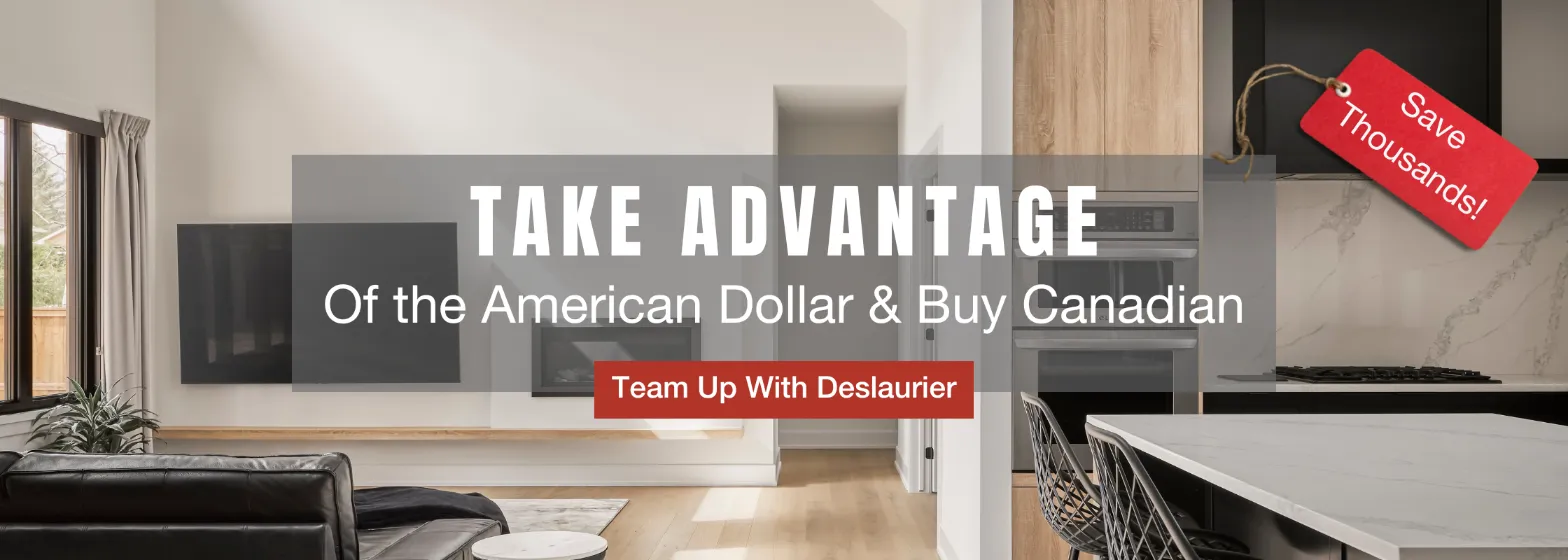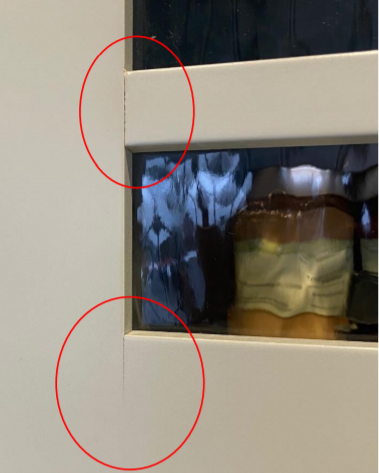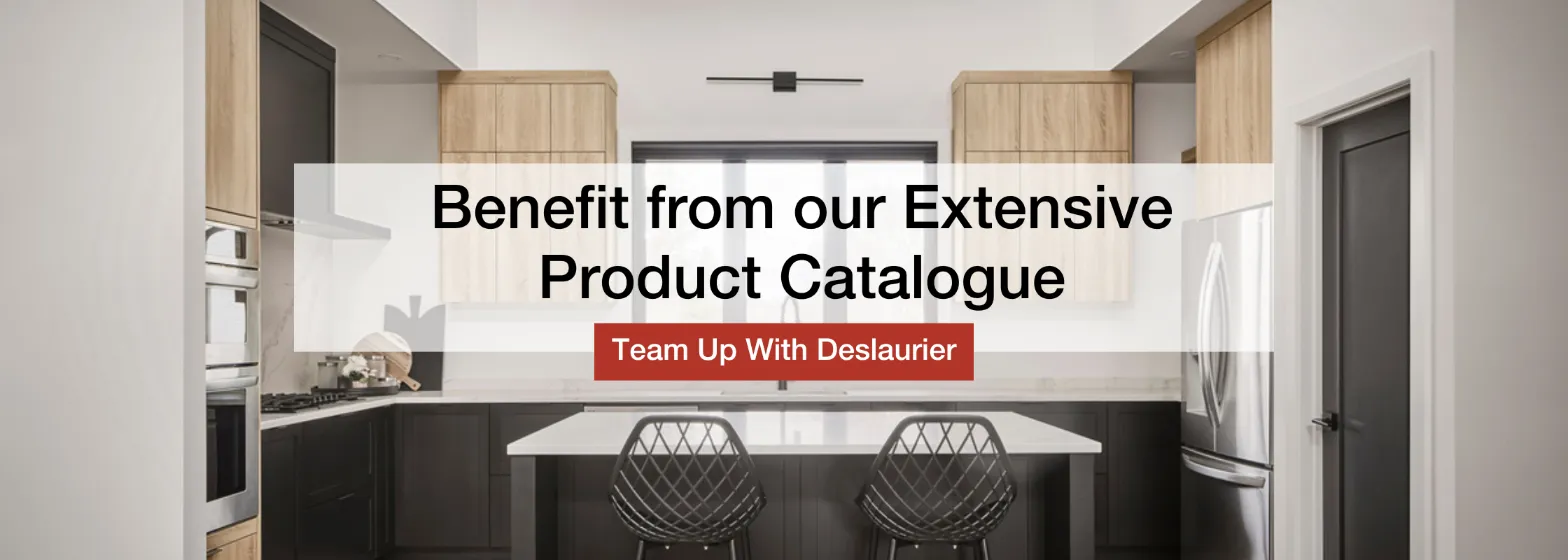5/04/2022 • Blog, Comparisons
Birch vs. Oak: A Comparison of Kitchen Cabinet Materials
Estimated Read Time: 7 Minutes
Picking the right cabinet material is a big step in the kitchen design process.
If you’ve been researching online for new kitchen cabinets, you’ve no doubt come across both birch and oak as options. Both are popular solid wood choices, so how do you decide which is better?
At Deslaurier, we’re experts in all things kitchen cabinets. As two of our most popular cabinet materials, we know how important it is to inform our clients of the differences and similarities between birch and oak.
This article will take you through all the characteristics of birch and oak as kitchen cabinet materials. We’ll compare the two options side by side to help you determine which wood species is right for your kitchen cabinets.
Let’s get to it!
|
Table of Contents |
|
Birch vs. Oak Cabinets: Appearance Birch vs. Oak Cabinets: Strength Birch vs. Oak Cabinets: Finishing Options |
A Note on Oak Cabinets:
It’s worth noting that not all birches and oaks are alike. Technically speaking, there are several different varieties of both birch and oak, and each one is slightly different from the next.
There are two major types of oak: red oak and white oak.
White oak is typically stronger and rot-resistant, making it more inclined to be used outdoors or for boats. That being said, white oak has become increasingly popular over the years for elegant (and more expensive) hardwood flooring and kitchen cabinets.
Red oak will often be slightly less durable, less expensive, and best suited for interior builds like cabinets.
The differences between these two categories can be major, so it’s crucial we clarify which we’re talking about.
For the purposes of this article, we’ll focus on traditional red oak.
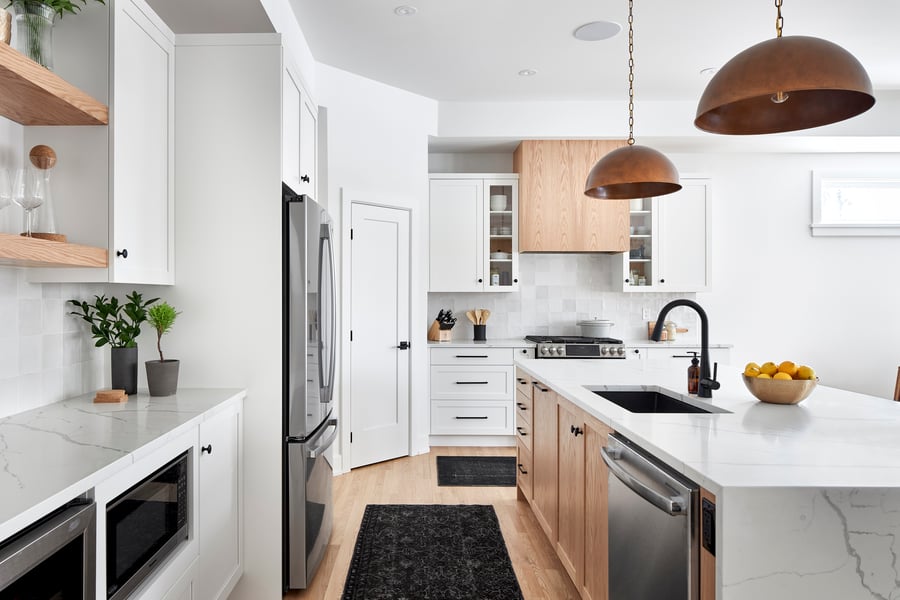
Birch vs. Oak: Appearance
Birch has a pale colouring that can look slightly yellow-ish. It has a simple, rather open grain that is typically made up of straight (ish) lines.
While birch is not as smooth as say, hard maple, it has a much smoother surface than red oak. Instead, oak has a raised grain which results in its surface being rougher and more coarse than birch.
Oak, on the other hand, has a light to middle brown colour with some reddish hues, complemented by a straight and tight grain pattern.
Here is the grain patterning of birch (left) and oak (right) side by side:
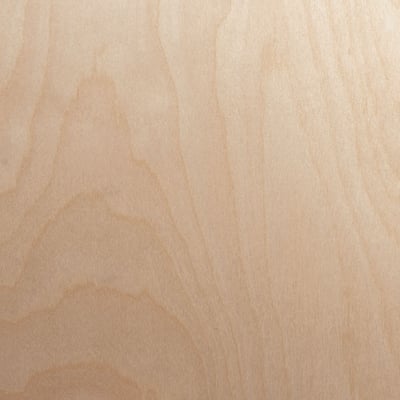
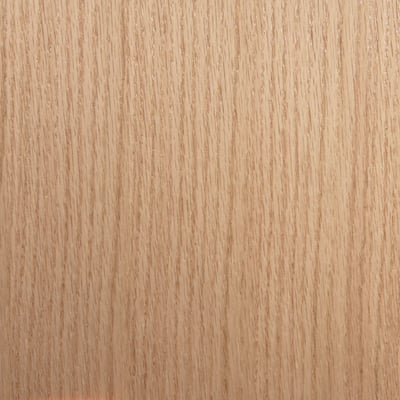
Remember, hardwood products are natural products—just like the trees themselves, no two cabinet doors are exactly alike. There will always be differences from one slab to the next, and that’s part of their beauty!
Further, all solid woods will darken or lighten due to a natural aging process. However, the aging process is unique for each distinct wood species.
Red oak, for example, retains its colour quite well. It can, however, slightly fade over the years and begin to lose a bit of its pigment.
Birch, on the other hand, develops colour with age. It presents itself as a yellowish-red tint as time passes.
Interested in how birch or maple cabinets would look in your dream kitchen? Kickstart your design process by booking a free consultation with a Deslaurier kitchen design expert!
Birch vs. Oak: Strength & Durability
When it comes to strength and durability, birch and oak are some of the best kitchen cabinet materials you can choose.
Birch and oak have a high tensile strength that can handily accommodate all the nails and screws required to make functional, modern kitchen cabinets. There’s no doubt that birch and oak make for solid and reliable cabinet materials.
In fact, birch and oak are actually quite similar on the Janka Hardness Scale. The Janka hardness scale is a measurement that determines a wood sample’s resistance to denting or wear.
The results of the Janka test determine the pounds of force (lbf) required to submerge a small steel ball to half of its diameter within a specific wood sample. The higher the number on the scale, the harder and more resistant to dents or scratches the wood is.
Birch comes in at 1260 (lbf) with red oak at 1290 (lbf). To put that into perspective, it's just below preeminently durable hardwoods like white oak (1360) and maple (1450), and above elegant woods like walnut (1010) and cherry (960).
Put simply, birch and oak are very respectable woods when it comes to strength and hardness, with oak performing slightly better. Now, if you’re careful around your cabinets, this difference in strength will be negligible to you as a user. Birch is still a strong and durable hardwood choice for kitchen cabinets.
Of course, the durability of your cabinets can come down to more than just the wood’s hardness. Whether your cabinets are stained or painted can also influence how susceptible to damage they will be.
That said, when it comes to cabinetry in a high-traffic, busy household, the difference in strength may translate to some extra years on the lifespan of your kitchen.
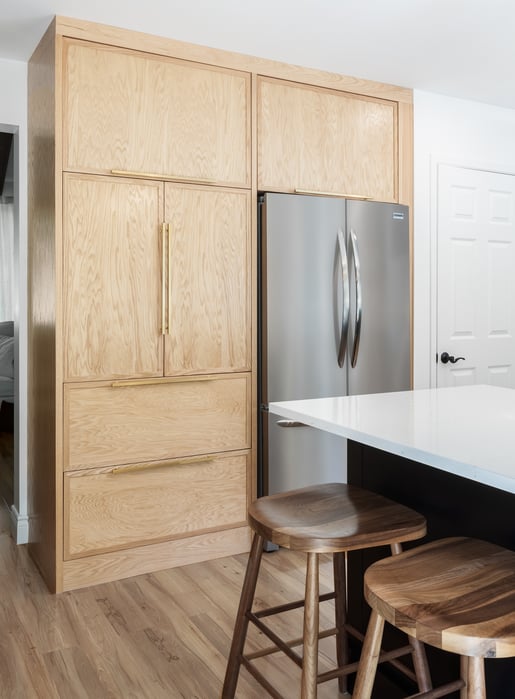
Birch vs. Oak: Finishing Options
The way birch and oak take to different finishes, like paints and stains (see our article comparing stained vs. painted cabinets), is often a big consideration in a homeowner’s decision.
Stains
Stains are a great choice for both birch and oak cabinets to highlight the beautiful, natural character of each wood species’ grain.
As we mentioned earlier, oak has a rougher texture than birch, which translates into a more matte stained finish. Of course, you can always counteract the natural surface of the wood by using a high-gloss or matte top coat.
Oak’s prominent grain makes it ideal for staining, as its texture will emerge proudly through a stained finish.
It’s worth noting that birch is a porous wood species. When it comes to using a dark stain on birch, it’s possible that the cabinet doors absorb the stain at varying speeds that can cause a “blotchiness” effect. Because of that, specific areas of grain pattern may be highlighted randomly with dark stains.
Paints
Birch is considered a paint-grade wood thanks to its low-key grain and uniform surface. If you’re going with natural wood for your painted cabinets, birch is about as good as it gets.
Oak, on the other hand, is not painted as often. Thanks to its raised grain texture, however, it can offer a unique aesthetic for painted cabinets. Oak’s prominently raised grain results in visibly (and physically) textured painted doors.
If you want your painted cabinets to have an added sense of natural wood character, oak is a great way to go.
You should also know that all painted finishes require a high level of maintenance to prevent dings and dents. There are no underlying wood species that can 100% protect your painted finish from damage.
Also, since both birch and oak are solid woods (and therefore, living, breathing products), both of these wood species will expand and contract with humidity changes.
Over time, that slow expansion and contraction will cause stress cracks (referred to as breathing) in the paint wherever there are joints in the cabinet door.
All natural wood cabinets are equally susceptible to cracks, as shown below:
If you want to prevent cracks, choosing a non-hardwood material like MDF is your best bet.
While not entirely impervious to cracking, MDF (medium-density fibreboard) is a manmade product formed by combining resins with different hardwood and softwood fibres. As a result, MDF is a more stable product than birch or oak—meaning it’s less likely to crack.
If you’re DIYing your kitchen cabinets, with either a paint or stain, check out our Learning Centre where you can read all about how to refinish and repaint your kitchen cabinets yourself!
If you’re going with paint, be sure to check out the latest kitchen cabinet colour trends for 2022!
Birch vs. Oak: Cost
Generally speaking, oak is almost always more expensive than birch. Birchwood is, most of the time, a cabinet maker’s entry-level product.
However, cost is always dependent on the grade of the wood, market conditions, and manufacturer.
For example, at Deslaurier, we source very high grades of wood, and as a result, our birch and oak cabinets may have a different purchase price than another cabinet makers.
It’s also interesting to note that red oak is typically less expensive than most other more exotic hardwoods. That’s because, like birch, oak is quite populous all over North America making it easier to source.
So, on one hand, oak is (often) more expensive than birch. On the other hand, oak is less expensive than alternative hardwoods like cherry or walnut, which are harder to come by.
Overall cost, of course, is also conditional on the type of finish applied to the cabinets. It will cost roughly 15% more for painted cabinets as opposed to stained ones. This is due to the increased labour involved in the painting process, as well as the cost that can come with high-end cabinet paints.
Ultimately, the cost of kitchen cabinets will fluctuate depending on both the material chosen and the finish that is applied.
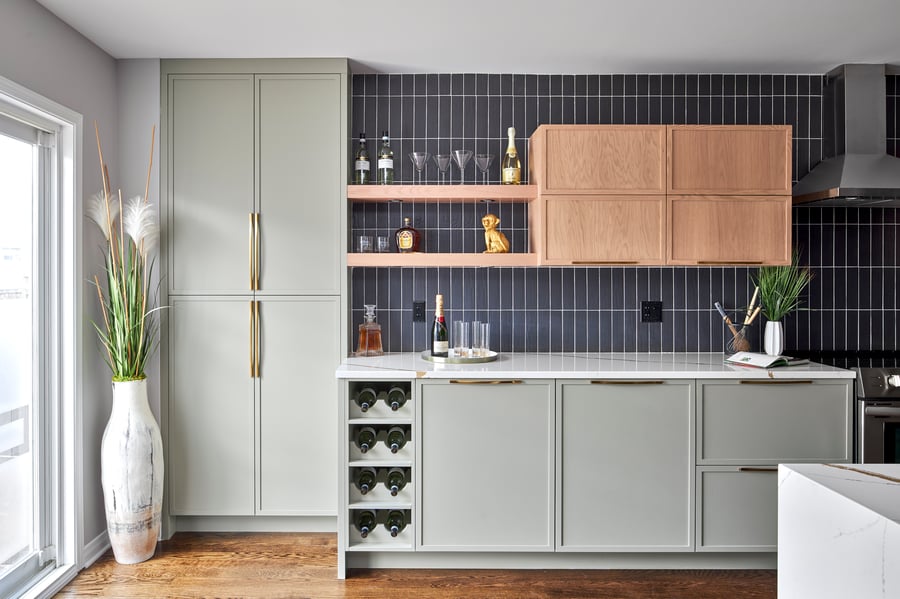
Birch vs. Oak: Which is right for you?
When choosing between birchwood and oak, it ultimately comes down to your personal aesthetic preferences. Since both options offer beautiful cabinets in their own unique style, it's up to you to decide which avenue suits your dream kitchen best.
If you want a smooth painted finish or more budget-friendly stained cabinets, then birch might be for you. If you want more character and a textured grain in your cabinets, oak certainly won’t steer you wrong.
Ultimately, it’s always important to weigh your budget, your finish choice, and your lifestyle to choose the best cabinet wood species for your dream kitchen.
Design With Deslaurier
Want to inspect the differences between birch and oak cabinets for yourself? Book a free consultation with a Deslaurier kitchen expert at our Jupiter, Florida showroom!
If you have your eye on custom cabinetry, Deslaurier Custom Cabinets has everything you need. With over 40 years of experience to our name, we provide our clients with a fully customized design process with our talented team of designers.
Interested in becoming an authorized Deslaurier dealer? Visit our Become a Dealer page to learn more! Live outside the area? Find a Dealer to connect with a Deslaurier dealer near you!

